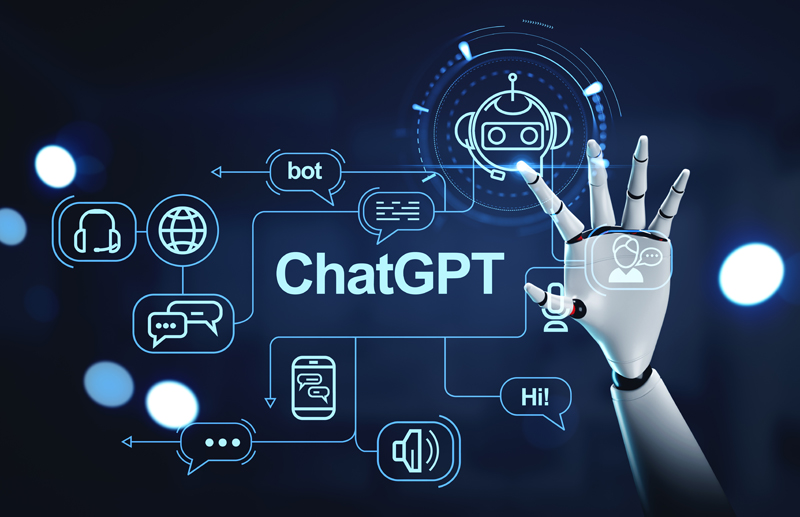You are here: Home / Blog / A Practical Guide to Writing ChatGPT Prompts that Give You the Results You Need
By Scott Owes on Dec 29, 2023

As a business owner, you may have tried ChatGPT for some part of your company’s marketing. Keeping abreast of technology is a necessity to do effective marketing these days, and Chat GPT has been all the buzz. But are you writing effective ChatGPT prompts?
ChatGPT, a cutting-edge language model developed by OpenAI, has been a game changer ever since it was introduced in November 2022 about a year ago.
Let’s take a look at how you can use ChatGPT in your marketing and how to write prompts that get results.
ChatGPT can generate human-like text based on the prompts it receives. Its applications in marketing are vast, ranging from content creation to customer engagement and market analysis. The key, however, lies in understanding how to effectively communicate with this AI tool to get the desired outcomes. Many of the specific prompt examples in this article are all directly from ChatGPT.
There are all kinds of ways you can use ChatGPT for marketing. Here are some of them.
ChatGPT can assist in generating creative content, including blog posts, social media updates and advertising copy, aligning with your brand’s voice and messaging. We do not recommend using what Chat GPT produces verbatim, but it can give you a solid starting point.
It can help in crafting personalized email content that enhances engagement.
ChatGPT can summarize and analyze trends, providing insights into consumer behavior and emerging market trends. Once again, this serves best as the beginning of your research.
It can generate SEO-friendly content, aiding in improving your website’s search engine ranking.
In order to get the results, you want from ChatGPT, you need to submit the right prompts. Following is guidance on how to effectively create the prompts that give you the results you want.
Be clear and specific. If you give ChatGPT vague prompts, you are going to get generic responses. Be clear and detailed about what you’re asking. For example, instead of submitting “ideas for marketing,” type a specific request such as List five innovative digital marketing strategies for tech startups in 2024.
Providing context is key to getting the best results. Give enough background information if your query is about a complex or niche topic. This helps the AI understand the context better.
Here is an example of a prompt that gives some context: Considering the recent trends in eco-friendly products, suggest marketing strategies for sustainable fashion brands.
Incorporate specific keywords relevant to your query into your prompt. This may seem obvious, but it bears saying that if you’re looking for information on SEO strategies, make sure to include SEO and strategies in your prompt.
If you would like to have your response in a particular format, you need to say so. Indicate that you want a list, a detailed but conversational explanation, a summary, bullet points and so on.
ChatGPT can write in different voices, but you need to tell it what you want. The tone of your prompt often dictates the response’s tone. You can also specify if you want a professional, casual, humorous or persuasive response.
If you don’t get exactly what you are after in the first round, you can refine your prompts to get better results.
General Information: Explain the concept of inbound marketing in a detailed, beginner-friendly manner.
Blog post: Create a comprehensive blog outline discussing the impact of AI on digital marketing, including key statistics, emerging trends and future predictions.
Social media strategy: Suggest five unique social media campaign ideas for a health and wellness brand targeting millennials, focusing on Instagram and TikTok.
Email campaign: Draft an engaging email for a Black Friday sale, targeting returning customers, with a focus on personalization and special offers.
Creative content: Write a short story about a time-traveling detective in a humorous tone.
Technical query: Describe the process of implementing a basic neural network for image recognition, including key steps and resources needed.
Leveraging ChatGPT for Competitive Analysis: Analyze the top three digital marketing strategies used by [competitor brand] and suggest how we can differentiate ourselves.
Brainstorm creative campaign ideas: Generate a creative story that we can use for our next brand campaign that resonates with themes of sustainability and innovation.
While ChatGPT is powerful, overly complex or ambiguous prompts might lead to less accurate responses.
Keep in mind that ChatGPT’s training data only goes up until its last update. For the most current trends or data, supplement ChatGPT’s insights with up-to-date research.
Ensure your prompts and their intended uses align with ethical marketing practices, avoiding manipulation or misrepresentation.
Be aware of biases in your prompts, as they can lead to biased responses.
Let the AI know which part of the response was incorrect or not what you were looking for. For example: Your response about SEO strategies included outdated techniques, which I wanted to avoid.
Prompt engineering is an iterative process. Test different phrasings and structures to see which yields the best responses. Keep a record of effective prompts for future reference.
Marketing technology is evolving more rapidly than ever before. Writing ChatGPT prompts is just one small area. It only makes sense to bring in experts to help you with your marketing while you run your business.
If you would like to set up a free consultation, go to the Umbrella Local website or call (646)440-1426.
Use our free tool to get your score calculated in under 60 seconds.